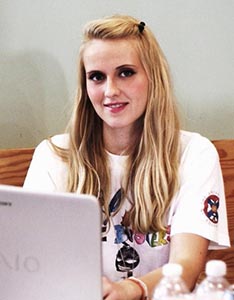Solvers provide valuable Intellectual Property for Seeker
Interview with an IdeaConnection Problem Solver
Julia Skripka-Serry has a Master's degree in Drug Discovery and a Bachelor's in Biotechnology. This is the second challenge she has worked on.
I was introduced to IdeaConnection by a classmate. I was about to graduate at that point and really wanted to continue to utilize my expertise and challenge my grey matter during a transition period, so IdeaConnection was perfect for that.
 How many Open Innovation Challenges have you worked on, and how many have you won?
How many Open Innovation Challenges have you worked on, and how many have you won?This was the first challenge I fully worked on. I had to drop out of a previous challenge.
I found this one to be very data mining-intensive and perhaps not as thought-provoking as some of the others. I think this particular challenge was rather straightforward but laborious. And this is the trend I am seeing on IdeaConnection – rather than seeking "innovation" per se, companies find this an easy place to crowdsource a lot of very cumbersome literature plowing.
Did you have an idea of what the Solution might be when you started on the Challenge?
I had a vague idea, but one of the other members had a very clear idea and we went along with it. Thank goodness for that!
I think in the short time span you are given as a solver it is important to stick to one vision, rather than to go off on tandems. It is important that everyone agrees on it so that the efforts of members can be effectively consolidated.
This challenge wasn't about the solution but rather about the literature search. We just focused on what information we were going to present to the seeker, and mined that topic relentlessly.
How did you feel when you found out you had solved a Challenge?
Disbelief – and I still haven't rid myself of the feeling. This was too unexpected for me.
What was it like to work with a team of experts in your field, as opposed to trying to solve the Challenge by yourself?
It was excellent – working in a small team serves as a self-motivator. If I were on my own it would be very easy to get off track or to lose determination. I think that having four people plus a facilitator sometimes becomes too crowded though. One of our team could not contribute on this challenge due to personal matters and we found that having a team of three plus a facilitator still worked great, if not better.
How do you find the experience of working with people from different backgrounds and cultures?
I find it an absolute pleasure, in particular because many of the people I work with are much more experienced than myself (I am a recent graduate). I constantly find myself in an environment where I can learn and be challenged. The fact that there is always something to learn from other team members makes me look forward to meetings every time.
Did one Team Member become a dominant person, or did all contribute equally?
Absolutely. There was a member who had a clear vision of what was to be done. This challenge wouldn't have been won without her vision.
What have you gained from the experience of working on Challenges with IdeaConnection?
As I lack practical knowledge in my field, perhaps the most valuable lesson for me was gaining industrial insight and outlook, understanding the biotech industry and what is popular in the industry right now. Also what companies normally have to go through to achieve innovation and to mine valuable intellectual property.
Having won a challenge gave me faith in my abilities, but even without the monetary reward I have gained so much in terms of knowledge and understanding. Essentially it is a win-win situation – there is always something to be gained from working on a challenge.
Did you find that having a Facilitator was a help, and if so, how?
Very much so. They are extremely useful for basic organizational tasks (ie getting everyone together, arranging meetings), but also for guidance and direction during the challenge, as well as for communicating members' queries to the "higher entities." Actually I always thought the facilitator idea was a great one.
What do you think about the concept of using Open Innovation to solve Challenges?
I think it is a great concept but I have noticed that it is currently evolving, at least in my sphere. It is moving away from the original concept of leap-like innovation to data and IP mining. In particular in the biotech field, large corporations like to patent as much as possible before they pursue some idea. This is where IdeaConnection can come in for them – providing a lot of potentially valuable IP.
Overall, how do you feel about working with IdeaConnection?
I really enjoyed myself and think this is one of the greatest ideas I have ever come across. I don't know if it has been as useful to solution seekers as to solvers, but as a solver I particularly enjoy the fact that I can do this part-time and it is just a great way to challenge myself on the side. I always advertise IdeaConnection to others and I haven't come across anyone who didn't think this was an amazing phenomenon.
